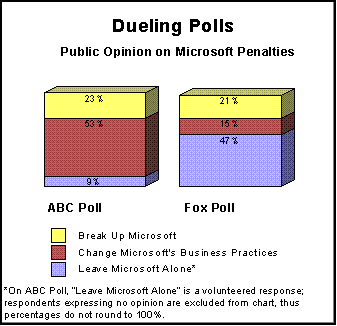 |
||||||||||||||||||||||||
|
||||||||||||||||||||||||
 |
||||||
|
||||||
 |
||||||||||||||||||
|
||||||||||||||||||
 |
|||||||||
|
 |
||||||||||||||||||||||||
|
||||||||||||||||||||||||
 |
||||||||||||||||||||||||
|
||||||||||||||||||||||||
|
What The Media Tell
Americans About Free Enterprise 
ABC Poll Fails to Capture Public Opinion on Microsoft Case More than ever before, the news media rely on polls as a way to gauge public reaction to political candidates, policy questions and other issues in the news. The data collected by such surveys is typically used two ways: first, to tell audiences what Americans think about a particular question; and second, as an internal guide for the news organization as it plans future coverage. But if the wording of the question is skewed, the pollís results may actually misinform both the public and the news organization that paid for it. A case in point was a poll conducted by ABC, which made it seem as if the public wanted to see Microsoft punished after a recent court finding of monopolistic behavior. In fact, ABCís pollsters never gave citizens the option of saying Microsoft should be left alone, but a poll for Fox News found that a plurality (47%) picked just that option. The long-running case landed back on the publicís radar on April 3, when Judge Thomas Penfield Jackson ruled that the company had illegally "maintained its monopoly by anti-competitive means." The next phase of the case, which will unfold over the next two or three months, is supposed to determine what penalties, if any, are to be imposed on Microsoft as a consequence of this ruling.
Just over half of the respondents (53%) said Microsoft should remain a single company with controls placed on its behavior. Fewer than a quarter (23%) said the company should be broken into several smaller companies. At the same time, Fox News was asking 900 registered voters their own question, which began with a sentence summarizing the recent ruling: "This week a U.S. District Court judge ruled that Microsoft has gained monopoly power by engaging in anti-competitive practices. Do you think it would be better for computer users if Microsoft: (1) is forced to pay a fine and change its business practices; or, (2) if Microsoft is broken up into a few smaller companies; or, (3) if Microsoft is mostly left alone? There are two major differences between the wording of the Fox poll and the ABC poll. First, Fox asked which option "would be better for computer users," wording that implicitly reminds the respondents that penalties could have either positive or negative consequences for Microsoftís customers. Second, the Fox poll included the obvious third option that ABC ignored: leave Microsoft alone. Here are the results of the Fox poll: 21 percent wanted to see the company broken up (about the same as the ABC poll), while 15 percent opted for a fine and changes in Microsoftís business practices. Nearly half (47%) said the company should be left alone. Intriguingly, nine percent of those questioned for the ABC poll volunteered the opinion that Microsoft should be left alone. Thatís a relatively large percentage of people to reject all of the pollsterís choices and offer one of their own, and itís a signal that their views on the issue are well-established and unlikely to change. Taken together, the two polls seem to indicate that the public would prefer that the case end with the least possible disruption to the software marketplace. ABCNews.com posted a story detailing the ABC pollís findings, and while it included the fact that nine percent rejected any government controls of Microsoft, it failed to point out that these were volunteered responses. The text of both the ABC poll and the Fox poll (including other questions asked about the Microsoft case) is available at PollingReport.com, an independent and nonpartisan collector of public opinion data.
Home | News Division
| Bozell Columns | CyberAlerts |
||||




 To
find out what the public would prefer, pollsters working for ABC
News asked 1,010 adults. "What do you think will be the best thing
now: for Microsoft to keep operating as a single company, but under
some controls; or for Microsoft to be broken up into several smaller
companies?" The interviewers were instructed to rotate the two
choices, so that half of the respondents were given each option
first.
To
find out what the public would prefer, pollsters working for ABC
News asked 1,010 adults. "What do you think will be the best thing
now: for Microsoft to keep operating as a single company, but under
some controls; or for Microsoft to be broken up into several smaller
companies?" The interviewers were instructed to rotate the two
choices, so that half of the respondents were given each option
first.